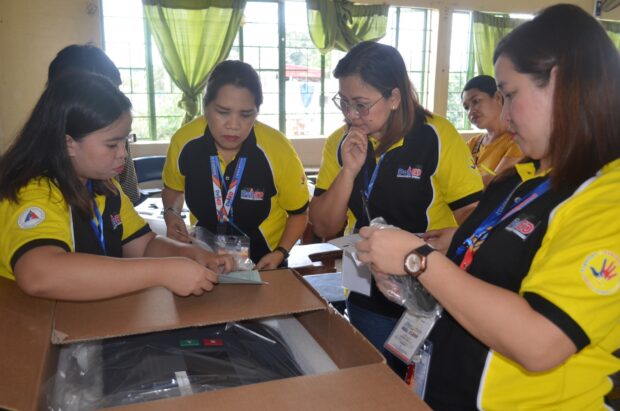
Final Testing and Sealing of Vote Counting Machines (VCMs), Judge Feliciano Senior High School in Quezon City | PHOTO: COMELEC Education and Information Department
Teachers who worked long hours during the Oct. 30 barangay and Sangguniang Kabataan elections may receive extra service credits but no overtime pay, while their colleagues who backed out of poll duty with no advance notice will face an investigation.
A Department of Education (DepEd) official said the agency may grant extra service credits to teachers who served more than 24 hours during the village and youth polls, but they would not be entitled to overtime pay, as demanded by a teachers’ group.
Assistant Education Secretary Francis Bringas said the teachers could only be given additional service credits on top of the five-day credits to which they were entitled.
“Service credits [are] not cash. But leave credits [are] equivalent to a day’s salary,” Bringas said in a Viber message to reporters on Thursday, in response to a letter from the Teachers’ Dignity Coalition (TDC) asking the Commission on Elections (Comelec) to grant its members overtime pay.
“In as much as we would like to give [overtime pay], however, there is this joint COA-DBM (Commission on Audit-Department of Budget and Management) circular which provides that only employees of an agency [are] entitled to claim overtime,” Comelec Chair George Garcia told reporters.
“The teachers who served as electoral board members are not employees of Comelec,” he noted.
On the other hand, Comelec will investigate the “very, very few” teachers who withdrew from election duty on Oct. 30, Election Day itself, without prior notice.
“We respect the decision of those who withdrew prior to the election, as it is an absolute right. Election Day duty is not mandatory to teachers,” Garcia said.
Sudden withdrawal
“But what about those very, very few who on the day of the elections when the precincts already opened, suddenly withdrew without any notice whatsoever? Complicating this is their refusal to turn over the election paraphernalia to their replacements for no known reason,” he said.
“This must be investigated to prevent similar incidents as things like this may endanger future electoral exercises,” Garcia said, adding: “Because we already spent for it, like their transportation allowance, and then suddenly they will back out. It seems like there’s something wrong there but we also understand that … it’s not mandatory for teachers to serve.”
He earlier said more than 2,500 had withdrawn from poll duty, most of them in the Bangsamoro region, prompting their replacement by police officers.
Under Republic Act No. 10756, rendering service in the election is not compulsory among public school teachers, as Comelec may appoint other persons for the task, including private school teachers, national government employees, or DepEd’s nonteaching personnel, among others.
But in an earlier briefing, Garcia pointed out that under Section 261 of the Omnibus Election Code, any member of any board of election inspectors is prohibited from “deliberating absenting himself … for the purpose of obstructing or delaying the performance of its duties or functions.”
“It is a criminal offense and an administrative offense at the same time. We cannot just let it go because it will happen over and over again,” he said.
Interior Secretary Benhur Abalos said he was in favor of pursuing legal charges against those teachers, but only if their stated reasons were not valid.
“I support that plan. Why? Because they were prepared for it. They were trained, and most importantly… just because of their actions, they will be denying people their right to suffrage? That’s unthinkable,” Abalos said during the Kapihan sa Manila Bay forum on Wednesday.
“Unless, of course, they have a valid reason. We must look into their reasons,” he said.
Legitimate reasons
But the Alliance of Concerned Teachers (ACT) said the government should focus more on addressing teachers’ valid security concerns instead of threatening them with investigation or legal action.
Vladimer Quetua, ACT chair, appealed for understanding for those teachers “who have legitimate reasons for choosing to distance themselves from possible threats to life and security, especially if it is the result of experience from previous elections.”
Quetua said some teachers who served on the board of election inspectors experienced harassment.
TDC chair Benjo Basas said: “If the teachers in these areas believe that security is inadequate, then it is a failure of the government.”
“However, if it can be established that these teachers only intend to sabotage or delay the election, which is very unlikely, then they may be held accountable,” he added.